Jacinto Mathe earns doctorate at Oxford, becomes Mozambique’s first PhD in Palaeoanthropology: ...
Cabo Delgado: “We need to stop the war” – interview with Yussuf Adam
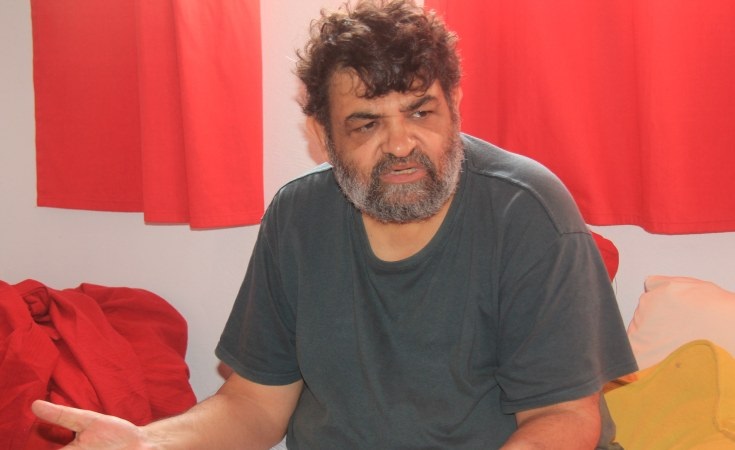
Historian Yussuf Adam. Euronews image.
- Historian Yussuf Adam says that “naturally, the situation in Cabo Delgado has to do with imperialism and capitalism”. And he warns that, regardless of ideological discussions, “if we don’t stop the war, we won’t have any success.” Interview conducted by Mariana Carneiro.
In an interview with Esquerda.net, Yussuf Adam, who openly presents himself as a Frelimo militant “since other times”, if not card-carrying, breaks with the official line and argues that the post-colonial development strategies adopted by the party were, essentially, “formulated on an ideological or political basis, without taking into account the socio-economic reality of Mozambique”, and did not “take into account the interests of the peasants and workers that Frelimo identified as the social basis of the revolution”.
According to the historian, investment projects associated with the extraction of natural resources “were made without any concern for the improvement of people’s living conditions”.
“Mechanisms must be found so that there is no more war,” he warns.
In an interview with Publico, you state that “the presence of Islamic groups angry with the state in Cabo Delgado is long-standing”. You also mentioned that, in colonial times, there was a lot of repression and that, from 1964 until the 25th of April, many were held in Ibo and other islands. And you said that, after independence and until the end of the single party Frelimo period, the relationship with religions remained very difficult, especially with Islam.
Well, first I want to make it clear that I think that the fact that they have arranged a religious or ethnic connotation for this revolt, for this war, whatever you want to call it, is recourse to a simplifying and self-legitimising device.
Most of the people in the insurgency are local. There are Mwanis, Macondes, Angonis, etc., involved in the insurgency. And you have Christians, Catholics, Muslims, Protestants and even animists. So this is a problem that goes far beyond any religious issue. Focusing the discussion on the causes of the attacks on religion or ethnic differences is reductive. We have all the eggs for an omelette of violence.
Although there were social differentiations, in Cabo Delgado there was always a connection between the peoples of the coast and the people of the interior. The people from the coast went inland to sell what they produced, essentially fish and salt. And those from the interior supplied them with cereals such as corn, millet and sorghum.
In extended families in Cabo Delgado, you can find various mixtures of ethnicities, often for reasons of business, colours and classes.
And the mixtures in Cabo Delgado are not only of blood, they are also of religions. There are practices which are already intermingled, which harmonise. There is no point in looking for ethnic or religious purities in the province.
On the other hand, it is natural that there were religious problems, but they are very old. Just remember, for example, that Frei João dos Santos [Portuguese friar] came to Inhambane in 1586, then left when Portugal was occupied by the Spanish, went to the Seine, and in the meantime, went up to Ibo. One of the things he did was to prohibit Christian women and Muslim women from meeting. And one of his achievements was burning down the Sofala mosque. In another episode, he forbade a flotilla of boats coming from the island of Matemo all decked out to celebrate the circumcision of the son of the local notable. I am not saying it was always like this, but there has been a certain amount of repression over the ages.
When did you first have indications that there were Islamic groups who distanced themselves from the local Muslim community?
Indications of Islamic groups that distanced themselves from the local Muslim community are nothing new. To give you an example, in 1985, when I went to Pemba for my honeymoon, I was approached by a group of ten men dressed as sheiks. They asked me for help, because their sons had been arrested by the troops, accused of terrorism. One of the young men was left without a leg. At the time, they explained to me that there was a group that was accusing them of practising an Islam that was not correct. None of my contacts in Pemba had information about the troop attack. When I arrived in Maputo, I didn’t get any information either. But there was already something going on in 1985.
In the post-independence period, did the tension around the right to land contribute to the escalation of conflicts?
Resettlement processes over the years, from the colonial period, through independence, to the present, translate into contradictions that generate revolt.
In post-independence, those who returned from the armed struggle in Tanzania, and wanted to return to their “old homes”, found their land already occupied by other people. Frelimo told them that they had to go and live in the demarcated places. One day I went to visit the village of Namenda, where water flowed right through the middle, and they told me they were doomed, because they had orders from the party to go live up there. They had to leave the area where they were and go down the road to the famous communal villages.
Several conflicts have arisen in this process, including religious ones. The villages were headed by their leader, who, supposedly, could not have a religion. The sorcerer, the man of the Catholic church, the Muslim, etc. they could only build their houses in the last row. In the centre of the village was the [house of] village president, who was the party’s representative.
And there was the question of “lion makers” [1]. I followed some cases, and they were heart-breaking. In one of the cases I studied, the man accused of being a “lion maker” explained to me that his land was at the origin of the conflict. “This land is mine. It was always mine, and I want it back. I have a right to it,” he told me.
During the armed struggle, Frelimo told him that unity was needed, that he should let the others use the land, and when the war was over, he would recover his property. But the social pyramid changed with the war. The lower groups went up, and the upper ones went down.
One day they took this gentleman from village to village, whipping him in public so that everyone would know that he was a “lion maker”. And so many other stories of “lion makers” have emerged. When killing a “lion maker”, the person is not subjected to criminal justice. It is a religious and witchcraft issue. You didn’t kill a person, you killed an animal. And then, when we go there to see it, it was a woman or a man [that had been killed]. And what did he or she have which was good? The land. A black, fertile land.
Once, Professor João Carlos Trinidad was in Palma at the court, and they presented him with a case. He looked and said the legislation was clear. It was homicide, they had to be charged and tried. The officials explained that those who “hunted the lion” were the notables of the village, the head of the assembly; the cousin of a general … This death squad was made up of powerful people.
And did the evolution of the socio-economic and political situation in Mozambique after independence increase the problems in the province more and more?
Sometimes, it seems that we never look at the historical process of disaggregation of the nationalist movements that took power in countries like Guinea, Angola or Mozambique. And this disaggregation took place in several ways. One is the loss of legitimacy.
If you read my book “Escaping the crocodile’s teeth and falling into the leopard’s mouth: trajectory of post-colonial Mozambique (1975-1990)”, which is available on the internet, you have there, on page 389, the reproduction of an oral history of a village president in Mueda [district].
The testimony illustrates the contradictions within the post-colonial development strategies, which generated resentment and created an entry point for Renamo. Due to their political positions, some individuals or groups of individuals have benefited more from independence than others. This is not a new thing. There were winners and losers.
In my opinion, after independence, there were a whole series of complications. I often say that movements of extreme violence started to exist very early. Frelimo was also a movement of extreme violence. Meanwhile, we had Renamo, which tried to enter the South via the Montepuez area, but was also present in the North, contrary to what is said.
One day, I was in the northern part of the plateau doing some studies about water and I saw the women returning to the village. They had travelled 30 or 40 km to fetch water in an area where Renamo was. They said that they had drunk water with the guerrillas and had held contact with them.
During the Renamo war, there was a lot of violence, by our army too. And these things that were hidden. I remember that, during that war, the areas where cotton was produced were defended by a private militia from LOMACO, owned by Tiny Rowland, which included many Gurkha mercenaries.
In the meantime, the general peace agreement was struck. At the time, there were clear examples of support from the population of Cabo Delgado to Renamo. Like, for example, when Dhlakama arrived in Mocímboa da Praia and everyone went to meet him at the airport. This does not imply that Renamo was able to take full advantage of the discontent generated by government policies.
In Mozambique we have a problem: the Frelimo party and the government are almost the same thing, they are confused. It is practically a party-state. And the post-colonial development strategies adopted by Frelimo were essentially formulated on an ideological or political basis, without taking into account the socio-economic reality of Mozambique. And, also, without taking into account the interests of the peasants and workers that Frelimo identified as the social basis of the revolution.
In addition, state policies ignored Cabo Delgado’s religious, ethnic and cultural diversity and, in fact, repressed Islam.
When I was in Balama, with Professor Allen Isaacman, a group of old people who had been removed from the island of Matemo – which the Portuguese army used as a concentration camp – asked us to explain to them why they were being mistreated. We asked: “Mistreated how?” They explained that they were Muslims, had fought against colonialism, were arrested and were on the island of Matemo and, on April 26, the Portuguese took them and placed them in Balama. And they picked up the Maconde and took them to Mapupulo, in Montepuez. Now they were being accused of being reactionary, counter-revolutionary, when they had fought and been arrested for fighting for independence.
Then, if you take a walk around Cabo Delgado, [the place] where you will find the most villages with zinc-roofed houses and cement floors – an important indicator of social differentiation – is Mueda, where those who receive benefits from the state as former combatants are concentrated. This does not include only combatants – we found people as young as 14 receiving the pension.
You have mentioned an idea, which circulates among the population, in the sense that there is currently an ethnic cleansing. In other words, in your field experience, you have found that, among internally displaced people, there is the idea that the insurgent attacks are being supported by Mozambican elites to expel local inhabitants from their lands.
Colleagues from the Centre for Public Integrity (CIP) themselves went to various places and the people told them exactly what I had already heard: “We are leaving our lands by force and we are being enslaved”.
I spoke with internally displaced people in the villages where they took refuge. They told me that this war was serving to exile them from their lands without paying them compensation. They [IDPs] wanted to return home, did not want to stay in those schools or go to the places where they wanted to send them. They asked for a paper that said what village they were from and that they have land there. But, given that we have a law which says that the land belongs to the state, suddenly, they do not possess that land.
When they talked to me about genocide, I asked them why they used that word, since they were not being killed. A lady looked at me and asked me if there was a worse death than being alive and not being able to live where you want. “It was better if they shoot us, because we wouldn’t suffer so much there. The trees where I went to perform my rites and prayers are there. The places where I buried the placentas when my children were born stayed there. My dead, my ancestors stayed there,” she told me.
Those who are being chased off are the ones generically designated as Mwanis. But we should refer to each of them by the name of the theocratic state where they come from: Palma, Pangane …
There is a song by a young man who says: “I am from Pangane. I eat fresh fish. I go to the sea every day. My neighbour is the sea. What am I going to do over there where I’m being sent? These villages have nothing to do with me”.
It is a bit like taking an Algarvian [southern Portugal] and sending him to Minho [north of Portugal]. The way in which these people are resettled destroys the chain of business and survival.
One of the big mistakes that are often made, because some put their interests and investments ahead of the common good, is to divide Cabo Delgado between coast and inland, when, in fact, you have to divide the province into horizontal slices, between the rivers. These are the real frontiers, that’s how the population moves. The north-south circulation is also made, but it is mainly made up of people who leave the Mueda Plateau and come to the Messalo River: to get married, to collect gold, to sow suruma …
Doesn’t foreign investment projects in the region, associated with the extraction of natural resources, exacerbate local social and political tensions? Notably with regard to the oil and gas projects, doesn’t it contribute to increasing the perception of injustice in income distribution and land management?
Who owns these concessions? Oil was not discovered today. There are maps of the different oil discoveries since 1923. In 1975-76, Frelimo discussed whether to enter the oil business. Samora said right away that it wasn’t worth it because we “didn’t have the nails to play that guitar”. It wasn’t worth it.
Of course, the damned oil is also at the root of the war with Renamo. SONAREP’s owner, Manuel Bulhosa, who financed Renamo, was a big oil tycoon here in Mozambique. Oil was big business. A friend of mine always said, “petroleum is politics, politics is petroleum”. And someone told me that, “politics is money, and petroleum is money” too. And it’s true.
Ownership of these oil exploration sites is something which has never been made very clear. And the land law was made to guarantee the state a monopoly over land and to reduce the rights of others to zero. There were no policies to protect and develop resources.
I am in favour of a development policy that makes the resources we have to grow more and more and the wealth and well-being of people grow more and more. Not to restrict freedoms, but to improve and increase freedoms.
The state did not properly discuss [this] with the communities, or did not listen to what was discussed. What happened to the land is, basically, that it was taken from the people.
Camila De Sousa, the sociologist and filmmaker, did a study for a consulting company, Norconsult, which was working for Anadarko. In the course of his work, the population told her that, with their land, they were making twenty times more than what Anadarko was offering them to abandon it. But the state had already done all the negotiations with the companies.
I interviewed a gentleman, who was the king there in Olumbe, at the first national seminar for resettled people, organised by Tomás Vieira Mário and his NGO. He told to me that he had asked the girl who had gone there to talk to him about the benefits, and that she answered, “development”. He told me: “I said to her: ‘Oh daughter, they have been talking to me about development since 1975 or before’.”
Everyone was convinced that they were going to get rich overnight, and that didn’t happen. There are also many complaints that there are no jobs for the people of Cabo Delgado. Many people come from the south, many companies from Zimbabwe disguised as Mozambicans, many companies from South Africa…
I remember being in a village watching electrical cables being laid. The workers were from Zimbabwe, but claimed to be from Mozambique. There must have been a local front man who was in the business and got the licenses. The local kids told me that they could do that job, that they only needed a chance.
There were still groups with money there. Do not forget that the business history of the region also dates back to 1964. These Portuguese who became Mozambicans, or who left for Portugal and then returned, who have double or triple nationality and bank accounts on various sides, also get involved in these businesses. And they take advantage of them.
If there was a desire to change the social pyramid, the maximum amount of local labour would be employed, at a decent wage. There has to be a vision that is useful to people. And what happens? Everyone sees who accumulates. This leads to revolt.
The investments were made without any concern for improving people’s living conditions. Houses began to be built for technicians and engineers, when what should have been done was to ensure that the people had good agricultural production, did not lose access to the sea, etc.
What needs to change in Mozambique?
One of the urgent things is to review the national education system. Give our children more opportunities. Have schools with the minimum conditions. And it is necessary to discuss these issues with the community. The state has to take the taxes [revenue] and invest to improve the population’s living conditions. Investing in health services, training and empowering young people, creating jobs …
What is the problem? What has been done with the money. The money used in the coastal defence system and the purchase of the arms was badly spent. Theoretically, we paid a million for what we could buy for a hundred thousand.
We need to end social injustice and corruption. The ‘machababos’ use social inequalities to recruit. They claim that they want to distribute the income equally. And they manage to capitalize on people’s discontent and revolt.
It takes a democratic state that respects citizenship, and in which citizenship participates in discussion and control.
You talk a lot about favouring dialogue …
When an army suppresses the population, it will join the others to take revenge. Right now, we are waging a war that people don’t believe in. And Frelimo and the Mozambican government are losing legitimacy.
If you try to fight this with repression, you are going to need more and more repression, and you are not going to get anywhere. The key at this point is that there is a permanent dialogue. It is necessary to negotiate immediately with these people. These people must be treated with respect for international human rights.
I am by no means a naive person. I know that there are classes, groups, interests, small and large businesses and corruption. But what happens is that all the analyses of Cabo Delgado are a kind of fruit salad. Everything is put in the same stew. To carry out any analysis, it is necessary to take into account the different factors and listen to people’s opinions. There are people who fought for peace in their districts and who were eventually arrested by the troops and the police accused of being machababos.
On the other hand, we still know little about this war today. There are no names. We don’t know who died. That information does not appear. And people are still afraid to speak; they live in permanent terror.
Then there is this whole issue of excessive politicization, ideologization. Our passage through Stalinism, through the “absolute simple Marxism-Leninism”, as António Quadros, a poet and painter, said, did not result in any great conquests.
The values that legitimised the liberation movements were values of respect for human beings, for humanity, and these organisations have deteriorated and have become this terrible example of that woman in Angola, Isabel dos Santos.
It is essential, therefore, that there is accountability both at the level of those responsible for corruption, for the diversion of public money, and also, at another level, for the abuses committed by forces on the ground.
I agree. But the problem is always, who “puts the rattle on the cat”?
And you have to be careful about who is sent to the war front. It is necessary to train, it is necessary to punish, it is even necessary to, before sending someone to war, do psychological tests and see what life stories these people have. Frelimo did this during the war.
Training in the area of human rights is important.
This is necessary at all levels. We have a training centre here – Acipol, which is an institution extremely concerned with the transmission of these values. Creating opportunities for discussion, criticism and self-criticism is fundamental.
How do you see all these announcements pointing to military intervention?
Honestly, I don’t see a military solution to this conflict, any more than I see a military solution to any conflict. I am not saying that there does not have to be a military intervention. If your enemy turns up with a bazooka, you cannot fight back with a slingshot. The problem with military intervention is how it will be carried out. War creates war, violence breeds violence.
I don’t know what the agreements are going to be. There are some groups and countries that I don’t like personally. I cannot support someone who has come to power through a massacre of thousands of people. I also cannot support groups or soldiers who have worked in Mozambique, tortured the population and created many problems. That Korean battalion of the Zimbabwean army in the Beira corridor acted in an extremely heavy-handed manner.
It is necessary to stop the war. War creates more war – without peace there is nothing. You live in terror, in fear. And there have already been so many years of war. Mechanisms must be found so that there is no more war.
But do you agree that talking about ideological issues and how capitalism and neoliberalism have led to situations like the one being experienced in Cabo Delgado is also important, so that we don’t make the same mistakes again?
We agree.
And it is also important to identify the interests that fuel these conflicts, not only in Mozambique, but in the domestic world.
Again, we agree. And, probably, we now have a neo-imperialism in the making , or we have conditions in countries where a small elite has gathered money and wants to be a kind of Arturo Ui, not to mention a Hitler. When financial capital wants to emerge, as a general rule, fascism is associated with that. Now, to fight this, it is necessary for society to become aware, and to become self-aware, and to fight against it. Otherwise, nothing can be done. There are times when you don’t have much of a chance. It’s like my friend says, [nothing to do except] walking “with your head between your ears”. And that’s a little bit like what’s happening here.
But perhaps there is also an international dimension that could allow us to improve the situation quickly. I don’t know – we shall see.
By Mariana Carneiro


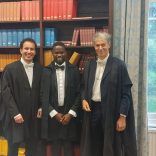

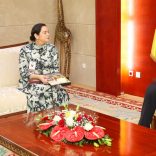
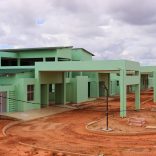
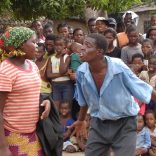






Leave a Reply
Be the First to Comment!
You must be logged in to post a comment.
You must be logged in to post a comment.